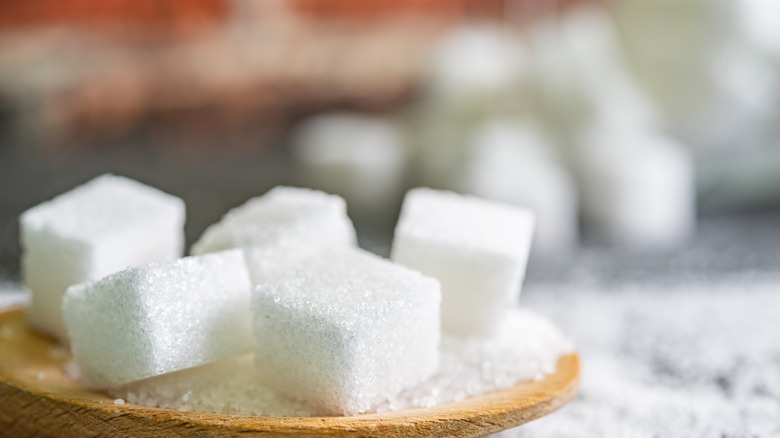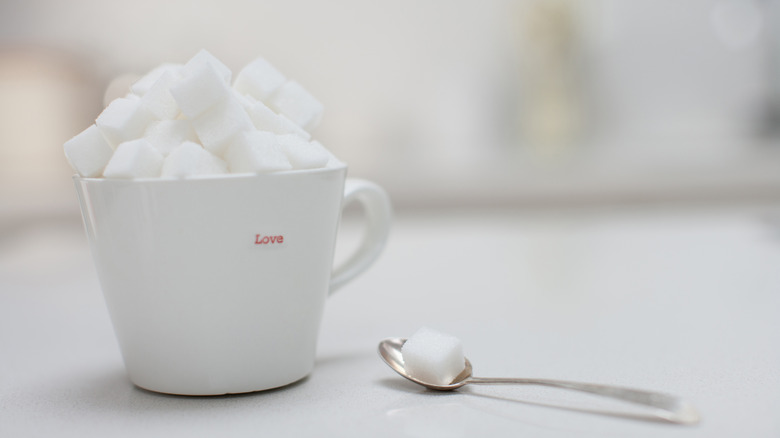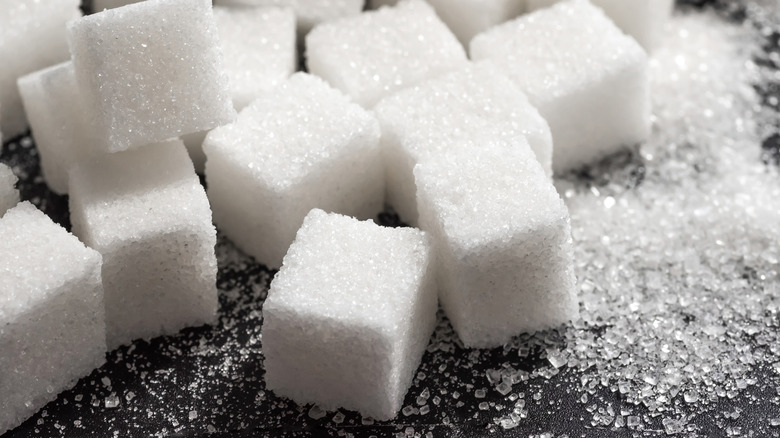The Gentle Sugar Cube Trick To Clean Your Favorite Pans
If there's one thing in life any cook has to do, no matter what dish they make or how fancy their kitchen, it's cleaning their pots and pans. In theory, this should be insanely, ridiculously simple– just run your pots and pans under hot water, hit them with soap, and then rinse them out. But not all stains are created equal and some seem to stick to the surface of your cast-iron or ceramic plates no matter how hard you hit them with hot water.
Fortunately, many foods excel at cleaning. Before you baffle yourself by considering the irony of cleaning food with food, here's a good example of what we mean. Have you ever used a lemon-scented cleaner to clean a stain on hardwood or tiles? That's because lemons are filled with citric acids, which means they can easily break down tough stains (and leave a delightfully fresh scent). Vinegar is also a very popular cleaning agent thanks to its light acidity and, while not a strong antibacterial agent, is good for cleaning glasses or plates. These are only a few of the natural cleaning agents that are prized not just for being common and inexpensive, but both useful and environmentally friendly.
But while you can understand how lemon and vinegar work thanks to their acidity, you may be a bit more confused as to how sugar– or sugar cubes– work in regards to cleaning. The answer lies within the shape and texture of the sugar cube itself.
Sugar cubes have a slightly abrasive texture
Take a few sugar cubes in your hand. How do they feel? Compared to holding a bunch of loose sugar in your hand, you may notice that the cubes have a grainy texture to them almost abrasive if you press them into your skin. While sugar cubes aren't exactly as abrasive as sandpaper, this gentle abrasiveness makes them perfect for cleaning tough stains on pots and pans.
To clean stains with a sugar cube, simply soak the pan or pot in water and then, very gently, work the sugar cube against the surface, going in slow circles. Don't try to press too hard, or else you may cause the sugar cube to crack and dissolve against the pan. As you scrub, you'll notice the abrasive surface of the cube removes the burnt or caked-on stains. If the cube starts to dissolve or becomes too dirty to use, simply use another sugar cube until the stains are removed. From there, wash and rinse your pan as you normally would to remove any sugar particles.
It's also important to keep in mind that sugar cubes may be good for cleaning smaller stains rather than larger ones. While a sugar cube may be good at removing burnt food from the bottom of a small pan, you may need to use a larger abrasive sponge to handle casserole dishes and deep pots to prevent going through a large number of sugar cubes.
Sugar is also very useful in cleaning other items too
While sugar cubes may be good for scrubbing off tough stains, loose sugar actually has many other uses aside from being an ingredient you put in your desserts. Indeed, sugar can play a key role in your arsenal of cleaning agents.
If you still have a coffee maker that grinds beans or just a regular coffee grinder, you'll find the inside of it may become clogged up with the remains of beans and dried coffee grounds. To remedy this, pour ¼ cup of sugar into the machine and then grind it as usual. The sugar particles will easily remove any stuck coffee grounds and clean any oils that may be gunking up the interior. You can also combine sugar with many different cleaning agents, such as vinegar, lemons, and baking powder to wash dishes, clean silverware, or remove spots of rust from certain appliances or areas of the home.
Another good use for sugar is for cleaning greasy or oily hands. By combining sugar, water, and even some liquid dish soap, you can create a very simple and effective degreasing agent, good for anyone who works in the garage or does manual labor.
Although large amounts of sugar may not be good for your health, it's not a bad idea to have a bag or two of sugar in your pantry. After all, it may be the only thing between you and a dirty kitchen environment.


